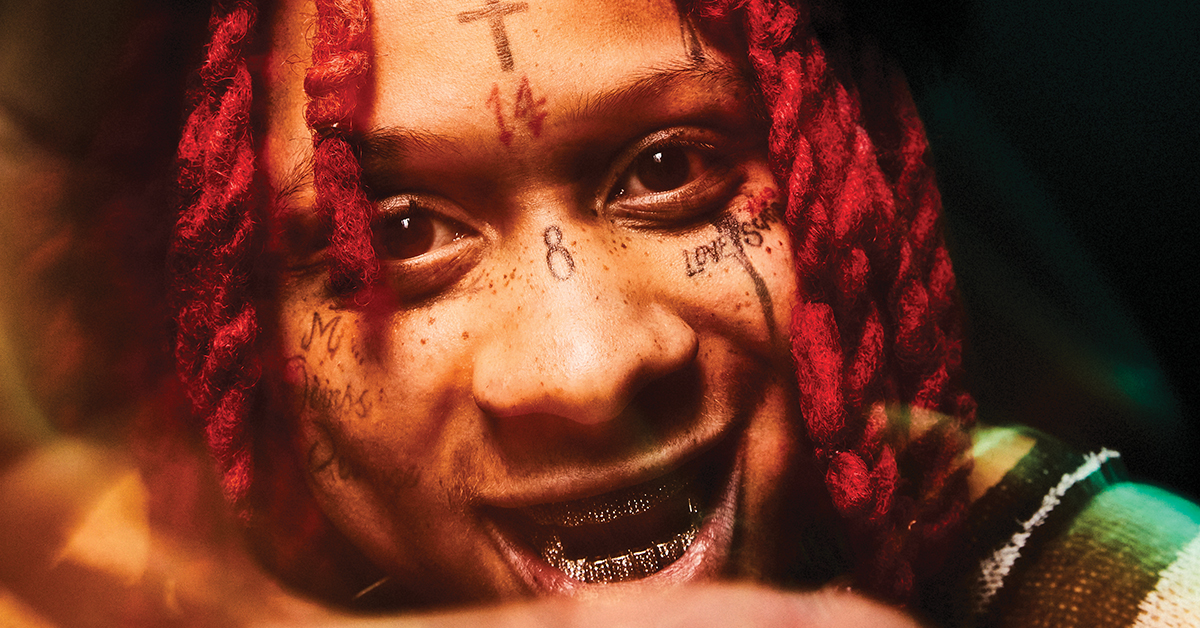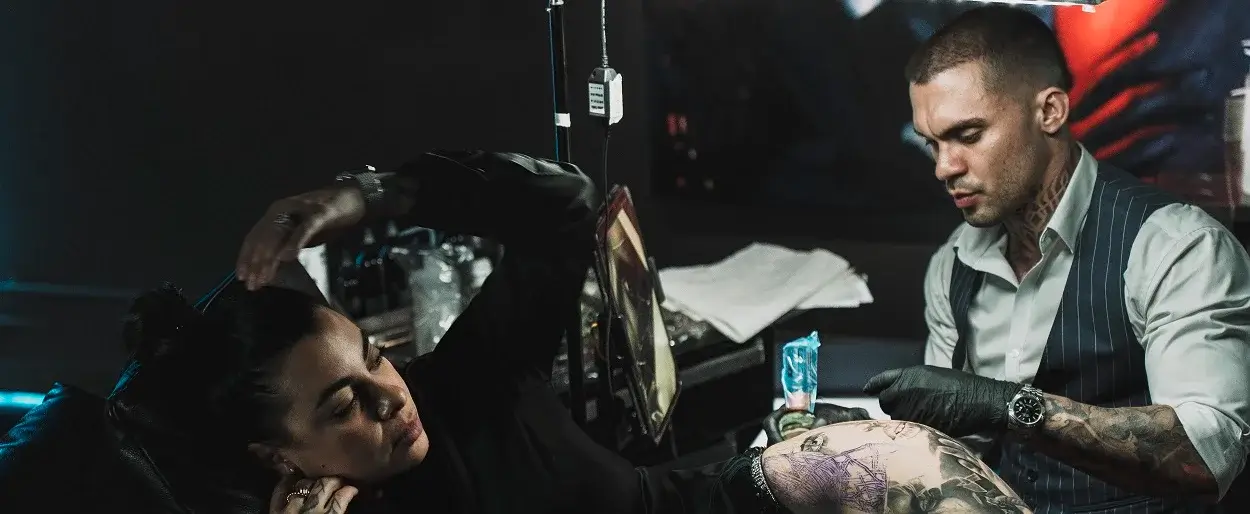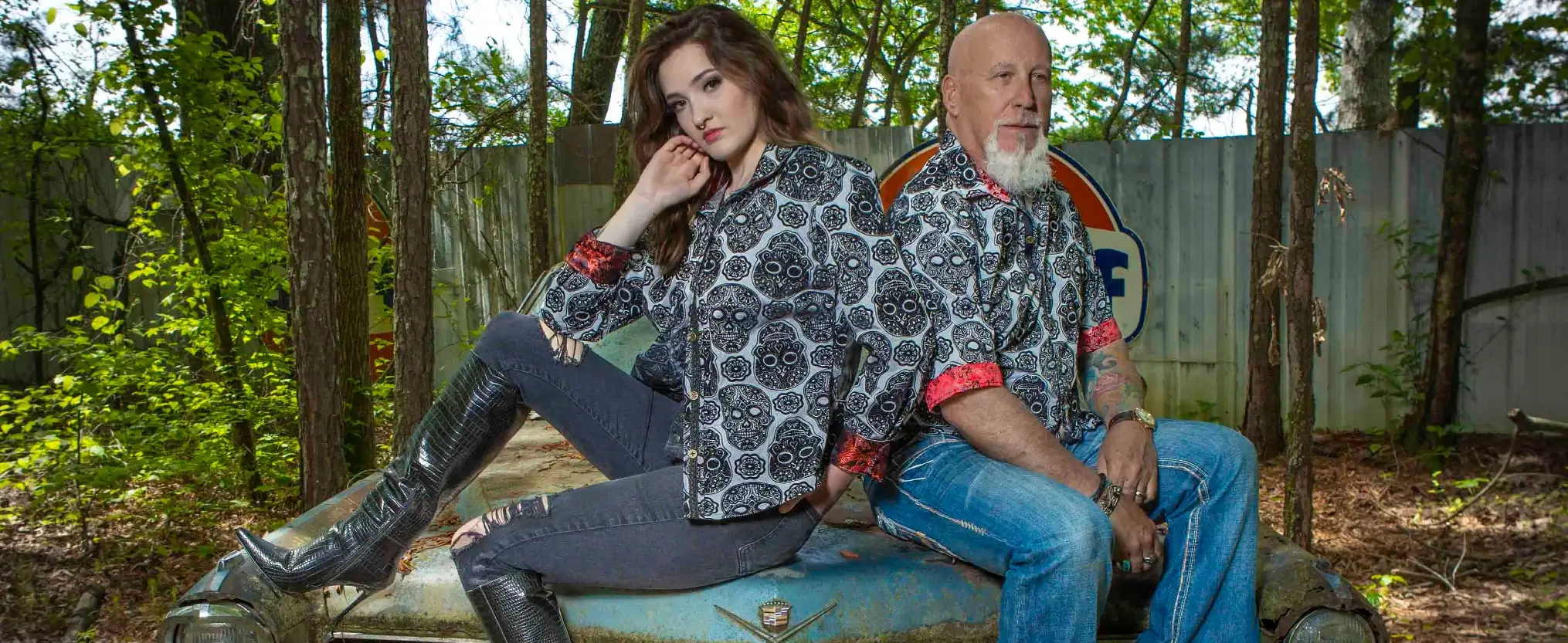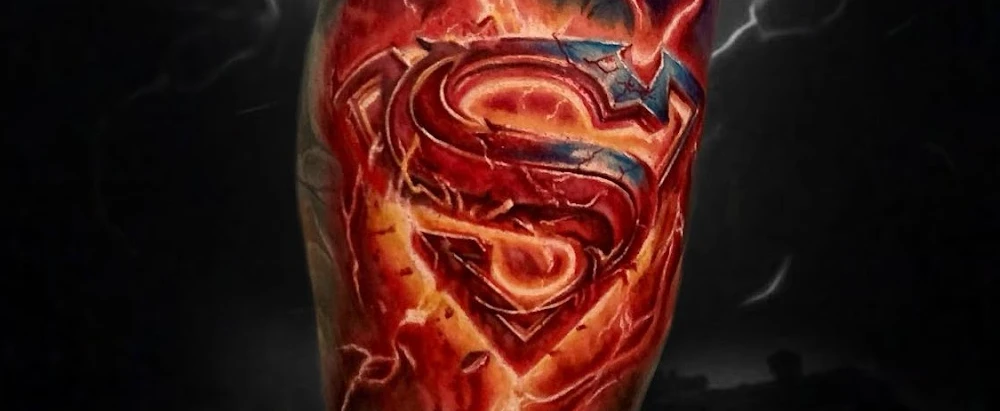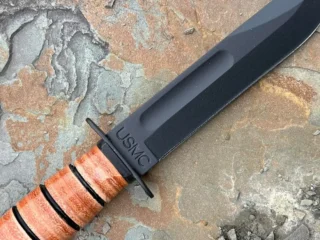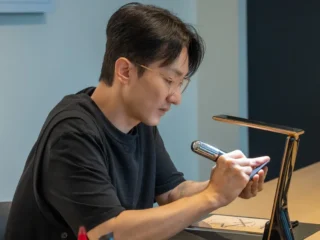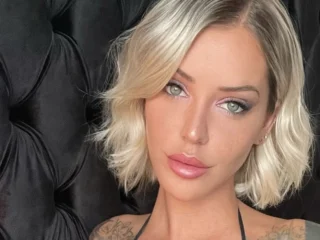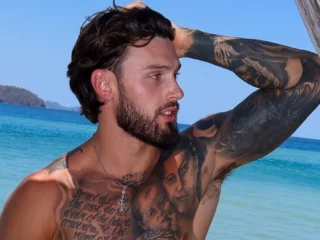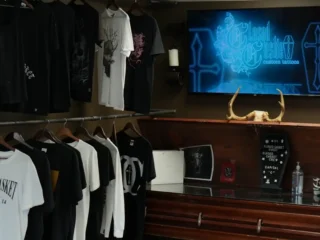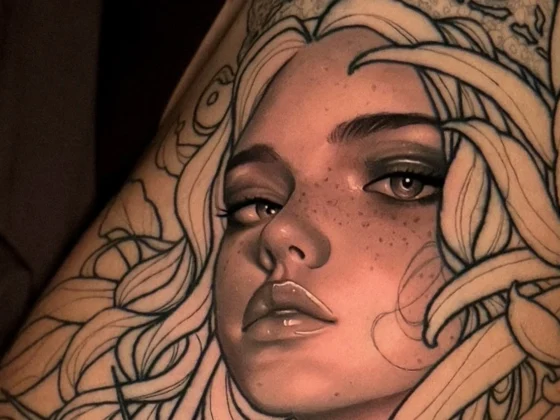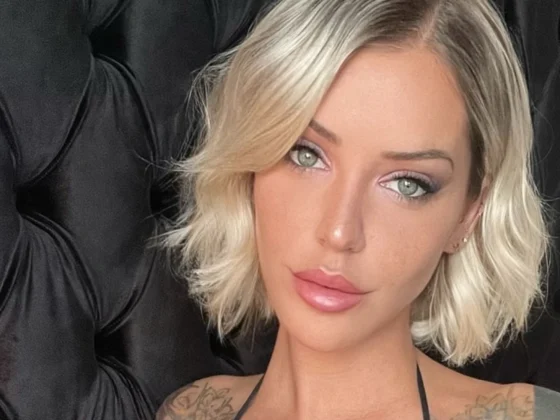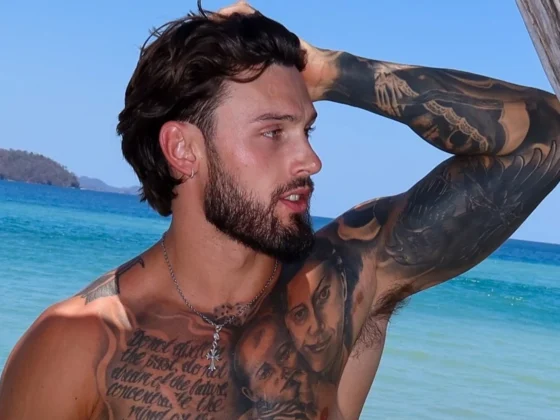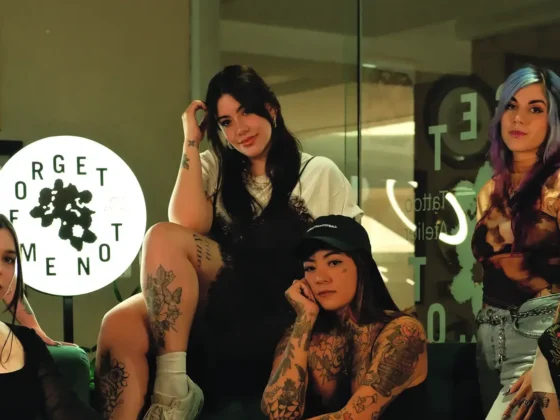Inked Mag Staff
May 19th, 2021
American Star
Trippie Redd’s rap-rock universe is blowing up.
by Christina Lee
Back in elementary school, Trippie Redd was in math class wondering about the greater significance of what he was adding up. “I figured numerology was more than numbers,” Redd says, leaning into a laptop camera from his Calabasas, California, studio. “Having a computer in class with Google made it easy.” Redd lived off 14th Street in Canton, Ohio, and looked up the significance of the number 14—which became his first tattoo five years later, on his forehead—as an angel number, or a number that people repeatedly notice and interpret as a message from the universe. “It elaborates on being balanced in life,” he explains. “Having and being one with balance is being very successful. It’s a number that keeps you knowing that you’re in good spirits and you’re on the right path.”
Most recently, Redd’s quest for balance manifested by way of two rap albums-turned-genre experiments: last October’s dreamy (and vaguely Prince-inspired) “Pegasus” and February’s “Neon Shark,” his rock debut. These are the creative ambitions of a 21-year-old who came of age to Lil Wayne as he picked up an electric guitar for 2010’s “Rebirth,” much to critics’ horror. Redd figured that this output, packaged as “Neon Shark vs. Pegasus Presented by Travis Barker (Deluxe),” would meet fans where they were. Which was largely “chill” and “instrumental” music to help manage the stress of living through a global pandemic.
“That’s what I thought was going on, you feel me? I was making it at the time they wanted it,” Redd says. But, as of this springtime Zoom call at least, what are people looking for now that vaccinations are underway? “It’s time to rage, boy,” he continues. “That’s what they want. They want it to be 2016 again. I’m like, OK. We’re going back to 2016.”

That year is significant, as 2016 was when Redd moved to Los Angeles after a brief stint in Atlanta. That year he dropped his first music on SoundCloud, making him one of the tattooed faces of the streaming platform’s burgeoning and blistering rap movement. Future 10K Projects label boss Elliot Grainge later described this phenomenon to Variety as a “full democracy with an average user age of 19.”
Redd was only 17, though he already knew to plan ahead. His commercial mixtape debut, 2017’s “A Love Letter to You,” features a song he wrote in either fifth or sixth grade, “Can You Rap Like Me?” The first few lines alone let you know the title is a rhetorical question: “I gotta get my fresh paper, boy optimistic, inflicted the premonition / My vision a place I visit when lifted.” Back then he was freestyling at the school lunch table (or wherever he could), “making songs where I wouldn’t have to punch in at all.”
Redd still has a soft spot for such dazzling lyrical displays. That’s what he fondly remembers about Juice WRLD, from when they first met in late 2017. “He was rapping like me back in 2015, where he could just keep it going, keep it going, keep it going,” Redd says. But by then, Redd also realized he can’t just be concerned with what he’s rapping, but how. He pays attention to how some songs could make him cry “when they hit certain notes and the beat sounds a certain way.” He sings part of Alicia Keys’ “If I Ain’t Got You” to prove his point (“Some people want it all / But I don’t want nothing at all…”).

This fascination also helps explain Redd’s breakout hit. “Love Scars/You Hate Me” put a finer point to his SoundCloud success, with its post-hardcore angst and now-signature wail balancing out the braggadocio. Millions of streams later, “Love Scars’’ helped announce the future of emo. It wouldn’t be in bands like My Chemical Romance or The Used, but in Redd and peers like XXXTentacion, Lil Peep and Juice WRLD, all of whom controversially made their mark before they turned 21.
Technically, the story behind “Pegasus” begins around then, too. The song that set the project’s tone was “Hell Rain,” the airy ballad featuring his musical idol and Young Money signee HoodyBaby. “I literally met Wayne right when I blew up, [2017’s] ‘A Love Letter to You’ vibes,” Redd says. “I was with Lil Twist every day and he low-key was trying to get me signed. So I just met Wayne through him, and then HoodyBaby. That song came about because we met each other and he fucked with me. It’s five years old, but it’s still fire.”
To speak with Redd is to constantly square what we know of him now with what we’ll know of him soon enough. “[I’m] three albums ahead right now,” he says. “I’ve been making so much music, it’s damn near almost four albums worth.” This news wouldn’t surprise fans, with how “Neon Shark”—produced by Blink-182 drummer Travis Barker and featuring Deftones’ Chino Moreno along with Machine Gun Kelly, Scarlxrd and ZillaKami—was teased and pushed back for two years. The album has a heavier rock vibe than Wayne’s “Rebirth,” and considering how radio and Spotify alike expanded their ideas of alternative to include rap, “Neon Shark” couldn’t have come out at a more perfect time.

It was Redd’s idea to package “Neon Shark” in the deluxe edition of “Pegasus,” making for a whopping 40-song release. “It was supposed to be its own album, but I don’t know,” Redd says. “With time going by and me working so fast on different projects, I just wanted to put it out.” He was pleased by the album’s reviews, though based on feedback he’s seen on Instagram, Twitter and Discord, he has to prepare himself for times when the COVID-19 pandemic is in the past and “doors are opening.”
One reference point for his next project, “Trip at Knight,” was his creative streak with Pi’erre Bourne. Bourne is the South Carolina producer who cut his teeth working with Redd, as heard in their 2016 collaborative “Beast Mode + + + +” EP, before helming signature Playboi Carti hits like 2017’s “Magnolia.” Redd describes what he did with Bourne as “some video game production type of shit. Crazy synths, crazy trap drums. Just not giving a fuck but caring at the same time about doing the music.” Yet one end result is a song like “Hyperpop,” whose title may or may not reference the internet microgenre to follow in SoundCloud rap’s wake.
“[We] definitely elevated the video game sound and made it way crazier,” Redd says. “The beats and everything, they’re crazy. They take dancehall shit, they take dubstep. They take all types of different crazy shit and use it and flip it in their own way and make it hip-hop, like trap. It’s hard.” Previously, Redd had described “Trip at Knight” as “‘Dark Knight Dummo’ shit,” comparing it to his double-platinum, ear-splitting single off 2018’s “Life’s a Trip.” No one would blame Redd if he wanted to make a more literal sequel to what he’s done before. But in his mind, Redd’s discography is more akin to a shared universe, and not the Marvel kind. He asks if I’ve seen “The Conjuring,” the 2013 film that launched eight spinoffs (and counting) based on Ed and Lorraine Warren’s past close encounters as paranormal researchers.

“That’s what ‘Trip at Knight’ is, a ‘Life’s a Trip’ spinoff,” he says. “It’s in no way, shape or form lesser than ‘Life’s a Trip.’ It’s taking one element from ‘Life’s a Trip’ and making it a whole, you feel me? The one element I took from it was more bigger sounding stuff, the fire fire, the ones that just keep you going and keep you moving. If it’s a sad song, you’re still going to rage.”
The way Redd sees it, he has to remember the creative highs and ambitions that went into making “Pegasus” (“I loved making the album, it was amazing making the album”) while also keeping the reception in mind. Last summer “Pegasus” leaked in its entirety two months ahead of its scheduled release, which blunted its overall performance. (Keep in mind that Pegasus still managed to debut at No. 2 on the Billboard 200, second only to Ariana Grande’s “positions.”)
“I didn’t really get the look I wanted from the album, but it still put me on a path and let me know that my fans want something different,” Redd says. “Either way it’s a win-win for me. The good and the bad still significantly keeps balance at the end of the day.”
These are the rules of Redd’s self-contained rap universe, and as long as he’s operating by those alone, he’s fine with that. “I just do what I do and people follow,” he says. “They don’t have to fuck with me to follow up the wave, but they’re going to see it and they’re going to follow.”
Who are we to question him? We’ve seen this logic add up before.

Editor's Picks
Bridging Classical Art and Modern Tattooing
Esteban Rodriguez brings the discipline of classical fine art to the living canvas of skin, creating hyper-realistic tattoos that merge technical mastery with emotional depth.
Show Your Ink Fashions Brings Custom Style to Tattoo Culture
Show Your Ink Fashions creates custom shirts designed to showcase your tattoos as wearable art, blending fashion with personal expression.
The Ultimate “Superman” Tattoo Roundup: Just in Time for Superman’s Return to Screens
With Superman’s big return to theaters, fans are revisiting some of the most iconic ink inspired by the Man of Steel.

